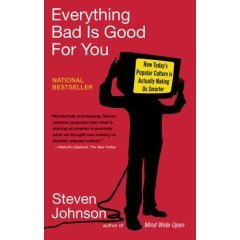
To think popular culture may actually make us smarter. Such a statement might elicit muffled laughter and the occassional guffaw, but a quick flip through your local primetime line up might just prove this to be true. In "Everything Bad Is Good For You: How Today's Popular Culture is Actually Making Us Smarter" by Steve Johnson he examines this emerging trend in the media and the implications it is having on content. (By the way I have read this book, and it's a quick and interesting read)
The foundation for this belief is that the content being presented on television involves more cognitive engagement then it did 30 years ago. For example, Johnson compares an episode of "Starsky and Hutch" to an episode of "24." Now, this might be like comparing apples to oranges, but if the overall content of both shows are examined it begins to show a massive difference. "Starsky and Hutch" only required its viewers to keep track of a few characters and follow a linear plot. "24" on the otherhand has at least 26 characters that the viewer needs to keep track of, plus they need to follow multiple plot lines and piece together the gaps between them. These more cognitive engaging programs do not solely exist as television programs, but extend further to video games, the Internet and movies. By distancing themselves from the formulaic presentation of content, it now requires viewers and users to use more brain power.
This increase in the sophistication of content has stemmed from the change of the guard in who is driving the wealth creation in the new media economy. According to Joseph Frydl, of a senior strategic planner at Ogilvy and Mather, "If the old economy was dominated by “Organization Men” -- rule-following agents of large companies who are charged with implementing systems -- the new economy is dominated by the creators of ideas. They create the new technologies, new ways of doing business, the spark behind great brands as well as the movies, music and images we consume all the time." It is these new "ideas people" are creating the demand for smarter pop culture and thus the creators of the media are begining to realize that "Because they're ideas people, stimulation and provocation enhance the value of popular entertainment."
This trend of increasing the cognitive involvement in pop culture will only continue to increase over time. With more individuals being drawn to HBO to watch the final season of "The Sopranos" or the viewers who religiously tune into primetime shows like "Lost" and "24" are just the begining of the sophistication of media content. As this trend continues it will begin to have a profound effect on what people view. Now, don't get me wrong there are still going to be people out there who watch wrestling and still believe its real or who tune in weekly and vote on "American Idol," but even these types of programming that are viewed as not being as sophisticated, still require their viewers to keep track of why Triple H has become a bad guy this week, or empower their viewers to become a talent scout and use their ears to figure out who is the better vocalist. And even in these small doses the increasing sophistication of pop culture is a good thing.
Article:
The Growing Sophistication of Popular Culture
1 comment:
I have been following a site now for almost 2 years and I have found it to be both reliable and profitable. They post daily and their stock trades have been beating
the indexes easily.
Take a look at Wallstreetwinnersonline.com
RickJ
Post a Comment